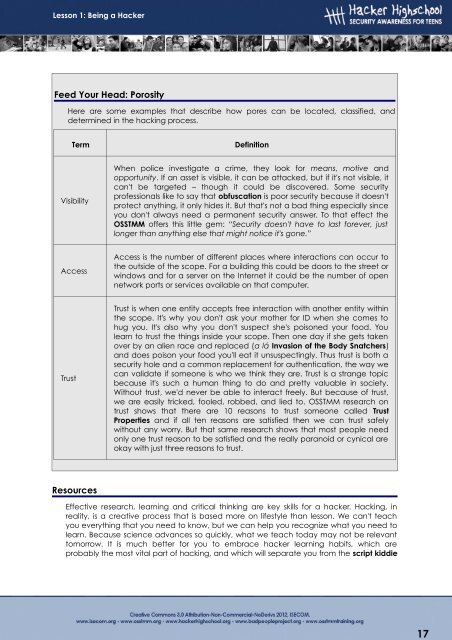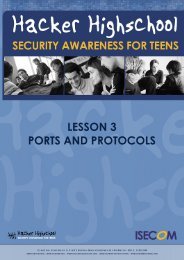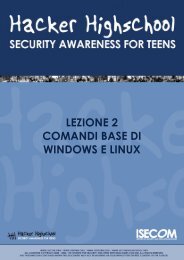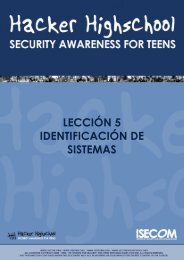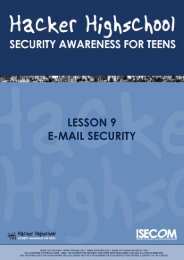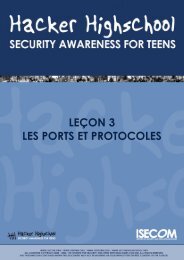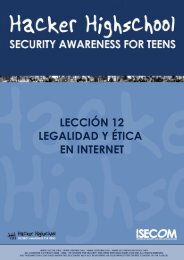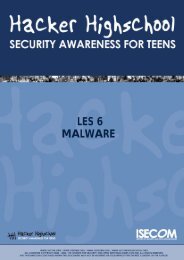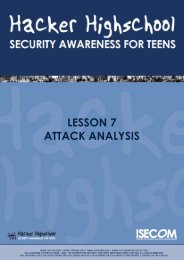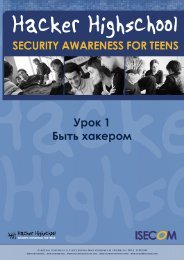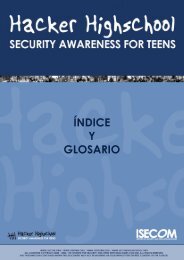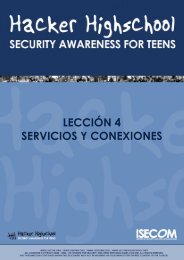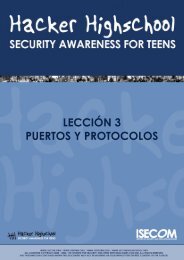Lesson 1: Being a Hacker - Hacker Highschool
Lesson 1: Being a Hacker - Hacker Highschool
Lesson 1: Being a Hacker - Hacker Highschool
You also want an ePaper? Increase the reach of your titles
YUMPU automatically turns print PDFs into web optimized ePapers that Google loves.
17<br />
<strong>Lesson</strong> 1: <strong>Being</strong> a <strong>Hacker</strong><br />
Feed Your Head: Porosity<br />
Here are some examples that describe how pores can be located, classified, and<br />
determined in the hacking process.<br />
Term<br />
Definition<br />
Visibility<br />
When police investigate a crime, they look for means, motive and<br />
opportunity. If an asset is visible, it can be attacked, but if it's not visible, it<br />
can't be targeted – though it could be discovered. Some security<br />
professionals like to say that obfuscation is poor security because it doesn't<br />
protect anything, it only hides it. But that's not a bad thing especially since<br />
you don't always need a permanent security answer. To that effect the<br />
OSSTMM offers this little gem: “Security doesn't have to last forever, just<br />
longer than anything else that might notice it's gone.”<br />
Access<br />
Access is the number of different places where interactions can occur to<br />
the outside of the scope. For a building this could be doors to the street or<br />
windows and for a server on the Internet it could be the number of open<br />
network ports or services available on that computer.<br />
Trust<br />
Trust is when one entity accepts free interaction with another entity within<br />
the scope. It's why you don't ask your mother for ID when she comes to<br />
hug you. It's also why you don't suspect she's poisoned your food. You<br />
learn to trust the things inside your scope. Then one day if she gets taken<br />
over by an alien race and replaced (a lá Invasion of the Body Snatchers)<br />
and does poison your food you'll eat it unsuspectingly. Thus trust is both a<br />
security hole and a common replacement for authentication, the way we<br />
can validate if someone is who we think they are. Trust is a strange topic<br />
because it's such a human thing to do and pretty valuable in society.<br />
Without trust, we'd never be able to interact freely. But because of trust,<br />
we are easily tricked, fooled, robbed, and lied to. OSSTMM research on<br />
trust shows that there are 10 reasons to trust someone called Trust<br />
Properties and if all ten reasons are satisfied then we can trust safely<br />
without any worry. But that same research shows that most people need<br />
only one trust reason to be satisfied and the really paranoid or cynical are<br />
okay with just three reasons to trust.<br />
Resources<br />
Effective research, learning and critical thinking are key skills for a hacker. Hacking, in<br />
reality, is a creative process that is based more on lifestyle than lesson. We can't teach<br />
you everything that you need to know, but we can help you recognize what you need to<br />
learn. Because science advances so quickly, what we teach today may not be relevant<br />
tomorrow. It is much better for you to embrace hacker learning habits, which are<br />
probably the most vital part of hacking, and which will separate you from the script kiddie


